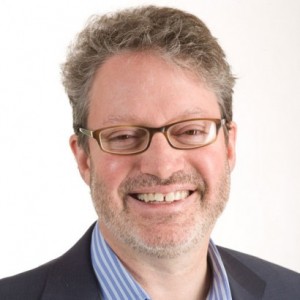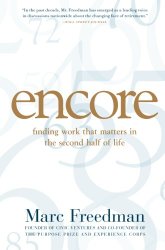By Jonathan Chevreau
I’ve been reading several books on Encore Careers, second acts and the like. A few weeks ago, we reviewed Marc Freedman’s The Big Shift. Over a one-week break in Florida, I read Freedman’s earlier book, Encore, subtitled Finding Work That Matters In the Second Half of Life.
Last year, on our sister site, we also reviewed Stephen Pollan’s 2003 book on the same topic: Second Acts.
All these books start with the premise that the baby boom generation may end up living a lot longer than they may have once imagined, which goes double for their own children and the generations coming after them.
Work that matters
If you believe that living to 100 is a distinct possibility rather than a one-in-a-thousand outlier event, then it follows that financial planning needs to take these extra years into account. Freedman’s Encore does suggest that a lot of American boomers (that’s the book’s focus) may need to keep working in part because of limited financial resources, but as the subtitle suggests, it’s mostly about finding “work that matters” in the second half of life.
There’s a lovely quote Freedman uses at the outset, attributed to Marge Piercy in the book “To be of use”:
“The pitcher cries for water to carry and a person for work that is real.”
A new stage of life

Freedman suggests there’s an entire new life stage between MidLife and what used to be called Full Retirement. This phase may begin after either an involuntary or voluntary departure from paid employment in giant corporate or government organizations. It could last 20 years, meaning there’s enough time to reinvent oneself and find an entirely new career, even if that means going back to school to qualify for it:
“The emerging reality looks like this: Retirement as we have known it is in the midst of being displaced as the central institution of the second half of life. It is being supplanted by a new stage of life opening up between the end of midlife and the arrival of true old age, a period that essentially amounts to the second half of life, at least adult life. And that’s just the half of it: The new phase under development is every bit as much a new stage of work.”
Funding Encore Careers
Freedman describes some Encore acts that were funded by raiding 529 plans, which are the equivalent of Canadian RESPs (Registered Education Savings Plans). Canadian RRSPs (like IRAs in the US) are similarly well-suited since the government has made it possible to tap retirement savings for higher education, as long as the money is eventually repaid.
All this also is strongly connected to the other blog category here at the Hub, which we call Longevity & Aging. Read this post from last week on Why Longevity Changes Everything: Why you should think twice about Early Retirement.
Great online resources
But back to Encore. This is one book I’d suggest buying as an e-book because the appendix contains many pages of useful web links to useful resources in government, education, health, the non-profit sector and much more. I’ve touched on a few here:
Retirement Jobs: http://www.retirementjobs.com
Nonprofit Times: http://www.thenonprofittimes.com
USAJOBS: https://www.usajobs.gov
Exploring Careers in Aging: http://www.exploringcareersinaging.com
Troops to Teachers: http://www.proudtoserveagain.com
The American Medical Association: http://www.ama-assn.org/ama
The Career Key: http://www.careerkey.org/
2Young2Retire: http://www.2young2retire.com/


